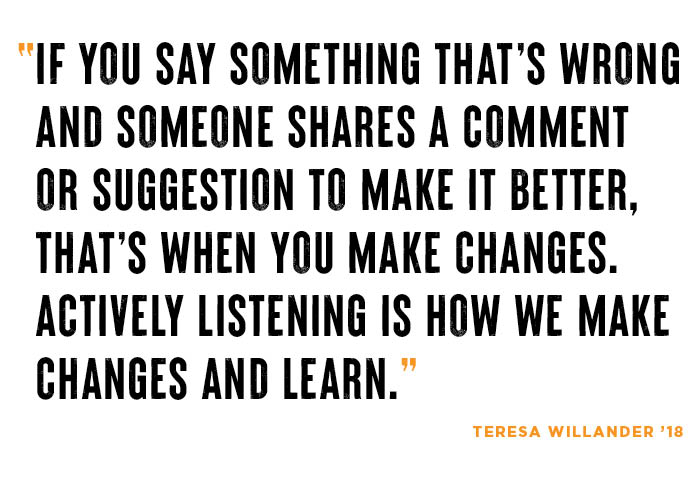Story by Kristen Walsh
Illustration by Tissen
“DO BETTER.” Two words, written to Regis by Teresa Willander ’18 on May 31, 2020, were a challenge to the university to publicly acknowledge that racism has happened on campus. A call to apologize for its mistakes. To listen to truths. To make change now—and keep making changes.
“As part of the broken education system, you are supposed to support your students, but this is how they feel. Do better,” Willander wrote.
She is not alone in her passionate call to address systemic racism. Following the murder of George Floyd, an unarmed Black man killed by Minneapolis police officers on May 25, 2020, the voices of anti-racist advocates around the world were loud and clear. Protests and marches. Social media posts and statements of solidarity. But, what happens after—publicly and behind closed doors—is what truly matters.
“Performative allyship is sharing your concern through a statement or a post on social media with a hashtag but not creating actions beyond those words or following through with them to further this movement,” Willander shared in a written statement she prepared for the “Community Dialogue: Racism in America” virtual event for Regis alumni that took place on June 5, 2020. The program was run by the Office of Institutional Advancement and Alumni Relations and cosponsored by the Center for Inclusive Excellence and the Center for Ministry and Service.
“Words mean nothing. Actions mean something,” Willander continued.
Regis Associate Vice President for Inclusive Excellence and Chief Diversity Officer Audrey Grace, JD, MEd, agrees. Practicing criminal defense law in Boston before joining higher education, Grace is hard-pressed to remember a day when she did not see systemic racism in the justice system.
“With my Black and brown clients, I recognized that I came into their lives during one point in a continuum of repeated indignities, disenfranchisement, and discrimination,” Grace says. “I saw how my clients were treated differently because of their race. But the law is structured so that it is difficult to seek racial justice while also ensuring the least harm to your client.”
SPEAKING OUT
It was one alumna’s story that had particularly struck Willander—that of Emily Josephine Melo ’12. A first-generation college student, Melo arrived at Regis in 2008 with big dreams as a double major in Spanish and biology. But like many college students, she decided to change majors, dropping biology and enrolling in the education program. She comes from a long line of teachers in her family. She was excited about the move. But that all changed quickly when she met with an administrator.
“I was told, ‘This program is going to be hard for a person like you.’ I was made to feel that I wouldn’t be successful,” Melo shared in a post on the Regis Facebook page on June 1, 2020.
But she was determined to be successful, working hard to keep her grades up. She was also active on campus, including serving on executive boards and as Class of 2012 secretary, a resident assistant, an orientation leader, and a member of the dance team.
Things took a turn, however, during senior year. That’s when Melo says she was abruptly dismissed from the education program for “not meeting benchmarks.” That benchmark was not passing one of her MTELS (Massachusetts Tests for Educator Licensure); yet she says her white peers who had not passed were allowed to continue.
“I shrugged my shoulders, cried a little, and stayed silent since 2011 because I never wanted to use ‘the racist card,’” recalled Melo, who was born in Boston and is Dominican. (Fast-forward several years and despite not feeling supported, Melo has put her Spanish degree to good use—as a Spanish teacher at Boston Public Schools.)
Unfortunately, Melo’s story reflects the systemic racism that happens at universities, companies, institutions, and agencies across the nation.
“It’s important for us to understand these experiences—good, bad, or indifferent—because that helps inform the work moving forward,” Grace says. “As always, the mission of Regis is to care for the dear neighbor and what that really means, and how we can truly care for the dear neighbor without distinction in what we do and make that true and real as opposed to just something that we say.”
“Students, alumni, faculty, and staff of color shared the struggles they have endured at Regis and beyond,” Regis President Antoinette M. Hays, PhD, RN, shared on June 10, 2020, in a statement “A Commitment to Do Better.” “Let me say I hear you, I see you, and I am heartbroken. There is no question that as an institution, Regis in some cases did not fulfill its mission to love, serve, and respect each other without distinction.”
“As we have learned, we have to use our voices and say something,” Willander says. “Many people are afraid to say the wrong thing, but this is the time for making mistakes and people need to be okay with that. If you say something that’s wrong and someone shares a comment or suggestion to make it better, that’s when you make changes. Actively listening is how we make changes and learn.”
MOVING AHEAD
Given the unfolding of events and long overdue public outcry against racial injustice, Grace is thankful for community support.
“We are talking about race and racism; we are having conversations about anti-Blackness; we are being honest with others and ourselves about the ways in which we have caused pain or where we still need to heal because of racial oppression,” Grace says. “Real, systemic changes require that we reach out to one another, engage in a dialogue, and look critically at how we can embrace a more socially just and equitable world. This work is an ongoing, lifelong commitment, but we know that it is essential.”
Regis developed an action plan—“Beginning to Address Systemic Racism”—that outlines ways the Regis community will accomplish the goals set forth in the president’s “Commitment to Do Better” statement. It will also serve as the framework for a longer-term Strategic Plan for Inclusive Excellence. Progress reports will be shared with the community at six months and 12 months. (For details, go to regisma.me/action.)
During the summer, Regis held several dialogues on racism in its community and beyond. “We heard from Black and brown students, alums, faculty, and staff who shared the daily indignities they go through just to be themselves,” Grace says. “But we did more than listen because our community needed more and demanded more.”
The Administrative Council and the Student Affairs and Enrollment leadership teams engaged in an in-depth racial healing experience over the summer, using a combination of readings, reflections, and conversations to better understand their racialized selves and how they can work to build racial justice communities in their work, according to Grace.
In September, Regis launched the “30-Day Challenge,” a month-long educational campaign during which the entire university community could “watch, read, or do” activities each day to be better equipped in its ongoing efforts to end systemic racism. Developed by Denise Mashmasarmi, associate director for the Center for Inclusive Excellence, content focused on a different aspect of race, equity, and diversity—from learning about the impact of bias to having effective conversations about race to educating children about racism.
“These initiatives are just a start, but they are not enough,” Grace says. “We need to make tangible steps toward systemic change as opposed to ‘check box’ items. As an institution, we have to make sure that we do what we say we’re going to do in this plan. We recognize that we haven’t been perfect in the past and that we need to do better for our students and for our entire community in the future.”

The Drifting Heartbeat
By Dimitri Stewart ’22
The natural beat is even and calm, it carries life and strength
Bu-bump, Bu-bump.
As they grab you, shove you and push you down, it beats faster
Bu-bump. Bu-bump. Bu-bump. Bu-bump
Each beat is more frantic and desperate, rising in intensity
As they hold you down, you plead that you’ve done nothing wrong
Bu-bump! Bu-Bump! Bu-Bump! Bu-Bump! Bu-Bump! Bu-Bump!
Your chest tightens as fear takes hold of your heart,
BU-BUMP! BU-BUMP! BU-BUMP! BU-BUMP! BU-BUMP!
BU-BUMP! BU-BUMP!
Choking it, tightening its deadly, poisonous grasp
Each breath gets weaker, begging, desperately for air
Bu…bump…Bu…bump…Bu…bump
“I…can’t…breathe…I…can’t…—”
and you drift off slowly…Bu
To an eternal sleep…Bump…
As part of the university’s action plan to address racism, this year’s Founders’ Day program, held on September 24, was a day of community dialogue on racism, equity, and social justice. “The past year has shown how important it is to speak up about injustice,” said Founders’ Day panelist Dimitri Stewart ’22. “We must always take the risk for what is important and right because that is how we bring about balance and peace.”
“Founders’ Day is extremely important to me because I believe a reflection within myself is a way to recognize the ways I can improve, which is essential to growth,” Rashell Mezquia ’23 said. “The change starts with us, the small things we say or do can be enough to have an impact on others. We cannot change the entire world at once but we can do our part in blossoming within ourselves … Not being racist is not enough; we need to actively be anti-racist.”
Jenny Vernet ’18, senior staff assistant at State University of New York College at Plattsburgh, was also a Founders’ Day panelist. “I’m a dark-skinned Black woman and I grew up in a predominantly white area for a majority of my life. When I got to Regis, I finally saw other folks who looked like me, and what happened was that I became insecure in my Blackness because of the experiences I had. I’ve had to really think about the ways that I’ve been socialized to think about myself and about folks who look like me. It’s been a long journey and is still a continuous journey, but truly it’s been an experience of affirming and realizing my Blackness.
“I want folks to be held accountable, I want folks to get the justice they deserve, and I want folks to be treated humanely. For the [Regis] alumni, our experiences are real and I know Regis has made moves to allow space for us to talk about that. We have to heal, and what Regis can do is to continue that process of healing; because if you don’t heal, you can’t save anybody else.”
Read more articles
Read the entire magazine online